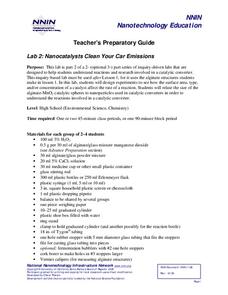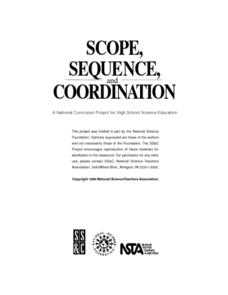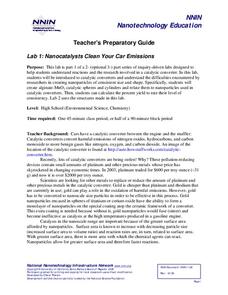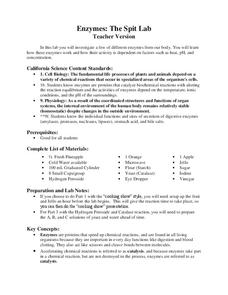Curated OER
Factors that Affect Reaction Rates
Collaborating chemistry pupils observe that temperatrue increases the movement of dye throughout water, stirring increases the dissolving rate of sugar cubes, and concentration of solutions increases the chemical reaction rates. These...
Curated OER
Identifying and Explaining Reactions
Introduce high schoolers to chemical reactions with this series of activities. In a little over an hour, scientists observe four gas-producing reactions: the combination of hydrochloric acid and sodium hydroxide, placing pasta in...
Curated OER
Catalysts and Enzymes
Biochemists experiment with the oxothermic decomposition of hydrogen dioxide by adding manganese dioxide. They observe how pepsin enhances the action of acid on the digestion of egg white proteins. They use yeast to make bread rise. All...
National Nanotechnology Infrastructure Network
Lab 2: Nanocatalysts Clean Your Car Emissions
Surface area certainly surfaces as a variable for chemical reaction rates. Scholars perform an experiment to discover how the size of catalysts affect the rate of a chemical reaction. They record their results in tables and graphs to...
Curated OER
Rate of Decomposition of Hydrogen Peroxide
Students devise an experiment to test the rate of decomposition of hydrogen peroxide. For this rate of reactions lesson plan, students use the given information in the lab to write a procedure that will allow them to find the rate of...
Curated OER
The "Clock Reaction" Kinetics Lab
Students investigate the effects of temperature and concentration on the rate of reactions. For this "clock reaction" kinetics lesson plan, students change the concentration of one reactant and keep the second constant. An indicator is...
Curated OER
Concentration and Reaction Rates
Students investigate how varying the concentrations, volumes, and other factors affects reaction rates. Students design and conduct investigations to obtain data used to create graphs of an uncatalyzed reaction vs. a catalyzed reaction....
Curated OER
What Influences Reaction Rate?
Learners study reaction rates, what determines how fast a reaction happens and how the chemical changes occur. In this reactions lesson students complete a lab where they use Alka-Seltzer to observe reaction rate and create a graph...
Curated OER
Experiment on Measuring Reaction Rates
Learners investigate the rate of a chemical reaction. In this rate of reactions lesson plan, students use an electronic balance to measure the change in mass of a chemical reaction between hydrochloric acid and calcium carbonate. They...
Curated OER
Reaction rates and Equilibrium
Students listen to a lecture on the collision theory. They discuss the reactant and product changes during a chemical reaction. Students are taught the factors affecting reaction rates. They complete a lab on entropy, heat and free...
Kenan Fellows
Qualitative Kinetics: Examining the Effect of an Enzyme on a Reaction
Scholars learn about kinetics and buffers as they use qualitative and quantitative methods to understand enzyme rates and buffer capacity. The application of Beer's Law and spectrophotometry solidifies pupils' knowledge in the first of...
Santa Monica College
Chemical Equilibrium and Le Chatelier’s Principle
Henri-Louis Le Chatelier wrote many papers throughout his 85-year life, but he is remembered for one of his earliest discoveries, now known as Le Chatelier's Principle. The final lesson plan in an 11-part series encourages young chemists...
Virginia Department of Education
Physical and Chemical Properties of Water
How can you effectively provide detailed concepts of water properties to your high school class in a way they find exciting and challenging at the same time? By letting them play, of course! Through a variety of...
Curated OER
Reaction Rates
Students work in groups of 4-6 for the experiment/activity part of this exercise. They base their explanation on what they observed. Students observe how substances react chemically in characteristic ways with other substances to form...
Science 4 Inquiry
Enzymes in Action
Enzymes play a role in almost every function in the human body. Scholars explore three variables related to the use of enzymes. They observe a catalase reaction, experiment with substrates, and examine reactions rates.
Curated OER
Chemical Reactions and Balancing Equations
Students perform various laboratory activities involving chemical reactions. They write balanced chemical equations for all reactions observed using computer software.
Curated OER
Rate Determining Step and Catalysts
Young scholars investigate the rate determining step in a chemical reaction and how catalysts effect reactions. In this rate determining step and catalyst lesson, students work in groups to perform 5 tasks. They rotate each task and time...
Curated OER
Investigating Factors That Affect Rate of Enzyme Action
Students explore the properties of enzymes. In this chemical reaction lesson, students explore enzymes through a Web-quest and investigative study. Students will collect and summarize data and create a class presentation. This lesson is...
Beyond Benign
Catalysts and Oxygen
Here is an engaging and hands-on lesson plan that allows high school chemists to demonstrate the effects of a catalyst on various chemicals. They garner knowledge of how reactants and products differ from one another, while...
Curated OER
Heat, Temperature, and Transfer
Physical science scholars discover an array of heat sources. They experiment to connect radiation to heat. They begin to understand thermal equilibrium. Then, they test to see if mass affects the rate of temperature change. Choose a few,...
Curated OER
Enzyme Lab
High schoolers investigate the enzyme catalase. In this enzyme lesson plan, students observe a normal catalase reaction, they observe liver tissue, potato, chicken and apple for the enzyme catalase and they study the effects of...
Curated OER
Chemistry Lab: Chemical Equilibrium
Students investigate the effects of adding or removing a reactant or a product on chemical equilibrium. In this equilibrium lesson plan, students add or remove ions to solutions to determine the effects on equilibrium. They make...
National Nanotechnology Infrastructure Network
Lab 1: Nanocatalysts Clean Your Car Emissions
What a big job for such a small particle. Young scientists learn about the role of nanoparticles in catalytic converters for cars. They conduct an experiment to create alginate-MnO2 catalytic spheres.
LABScI
Enzymes: The Spit Lab
Enzymes in our bodies each have a job to do. Learn the factors that affect the activity of some enzymes using the third activity of an informative 12-part biology series. A three-part laboratory activity asks teams to investigate how...























